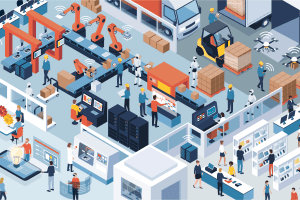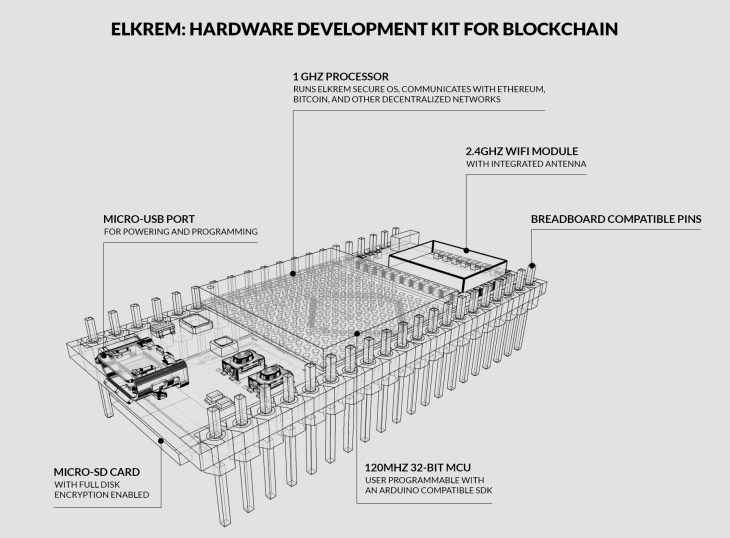Discover Elk, a blockchain dev board for decentralised IoT

Credit: Elk
Over 180 people on Kickstarter have backed Elk, a development board for blockchain that combines Arduino with native support for decentralised networks.
Blockchain has boundless potential in the world of IoT. For example, tracking products in a store can help to eliminate the doubt over where they’ve come from and how long they can be fresh for. However, this is just the start of what could be a brave new world for the internet.
Now, a new development board called Elk – which is being valued at just $59 for early backers – is promising to give hardware developers a chance to build decentralised IoT. It uses Arduino along with native support for decentralised networks: so building IoT that interfaces with the likes of Ethereum, IPFS and Whisper is easy.
Elk enables the building of what its creators call “Decent IoT”. This is a kind of IoT that gives you enhanced control, privacy and security. Given the security issues that IoT faces, incorporating blockchain onto a board is an idea that could allow developers to create products that accept payments and offer peer-to-peer communication.

The board even includes a mobile app that allows you to communicate with your hardware privately through decentralised technologies.
Why is Elk different?
The board originally appeared in 2018 under the name Elkrem. Its creators were also the team behind 1Sheeld, a hardware board used to add extra Arduino shields to a smartphone and instil it with extra functionality.
Raspberry Pi can be used to develop blockchain IoT devices. What makes Elk so exciting though is that it uses a microcontroller, a microprocessor, a Wi-Fi module and storage, so there’s no issue with setting up nodes and tuning parameters. This is an interface that Arduino users will be used to, though the experience is more user-friendly.

The team behind the board hope that Elk will allow developers to focus more on the applications themselves rather than overheads. There is a lot of potential for blockchain beyond just cryptocurrency; current IoT architecture is almost universally centralised and as the Internet of Things grows, this board could provide new, unexplored opportunities.
Decentralisation in IoT can, for example, eliminate third-party data and allow users to sell their data instead. There’s also privacy between communication.
The best thing about this is that Elk is extremely easy: it only takes a few lines of code to implement. Perhaps decentralisation will catch on in the IoT world if it’s this user-friendly?
How could Elk be used?
IoT is growing every day. Devices will hit the hundreds of billions in no time at all, as everything from our clothes to our fridges become internet-enabled.
Innovation is fueling the IoT market. There is no industry that will untouched by ingenious ideas and blockchain offers three distinct advantages for the Internet of Things: it helps to build trust by decentralising IoT, it can reduce costs by cutting out middlemen and overheads and it can accelerate transactions.
Elk offers a plug-and-play experience, just like an Arduino. You won’t need to deal with wallet and keys management, fuss over setting up nodes, tune their parameters to run well on an embedded device, handle crashes, etc. Elk “just works”, so you can focus on building cool applications and not on the overheads when exploring decentralization.
The official Elk Kickstarter
Consider some of the inventions that could possibly come from this technology. Imagine a gym for example that could return your subscription fee to you, should you hit milestones: this is possible from blockchain registering when you’re using a treadmill and having access to your crypto wallet. Equally, an alarm clock could charge you money every time you hit snooze. It would be possible for a fridge to charge you for taking food from it, so you only pay for what you use.
If you’re looking privacy rather than payment, it’s possible to build a decentralised home automation system with a door lock and smart lights that aren’t reliant on third parties. Devices such as the Amazon Echo may well adopt this technology to ease concerns over the manufacturers eavesdropping into consumers’ living rooms, whilst smart cities could implement blockchain in a bid to quash “surveillance city” reputations.
Whilst blockchain and IoT continue to revolutionise the world separately, combining the two may prove to be a masterstroke to developers. Elk is well worth keeping an eye on and could provide incredible innovation in technology.
